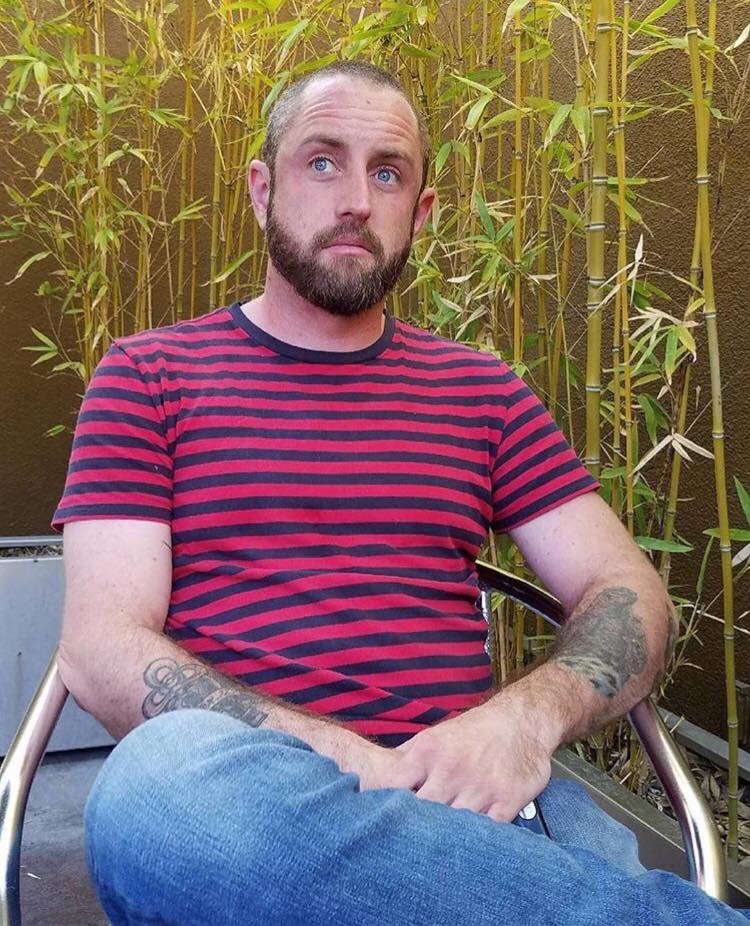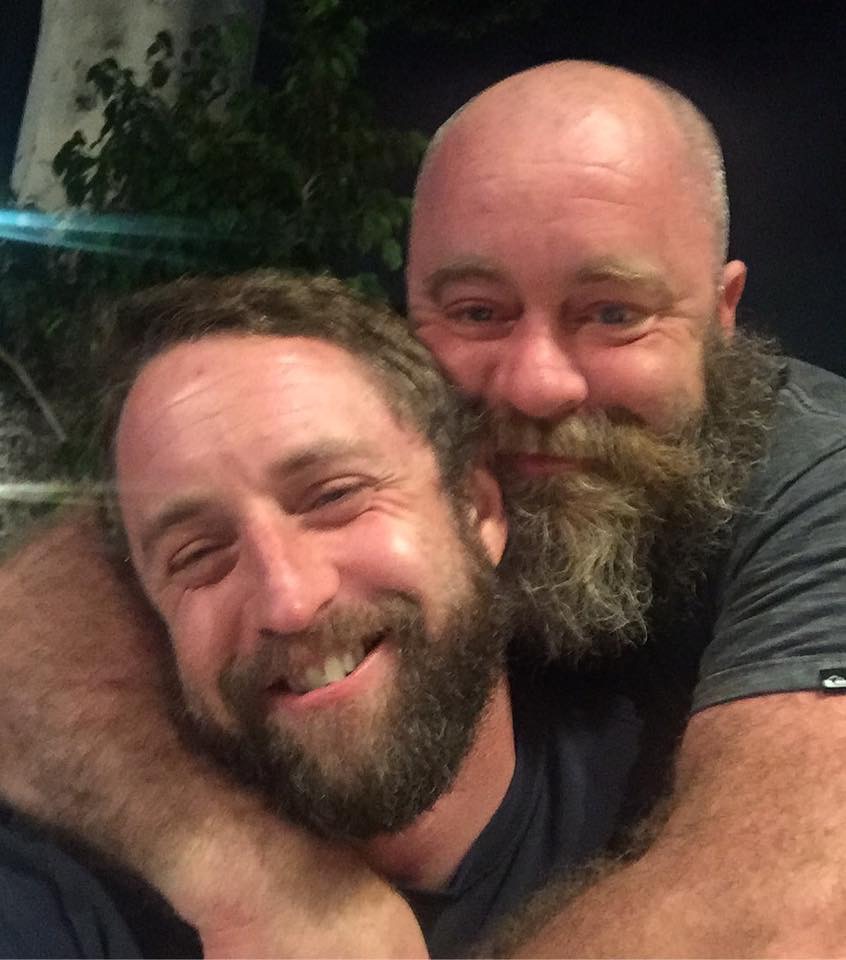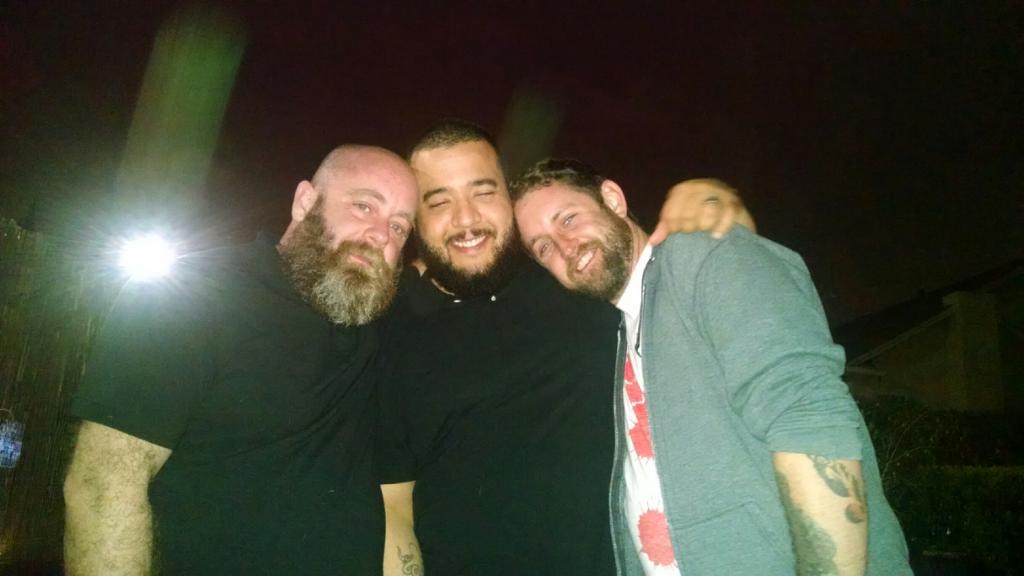Three and a half years ago my husband Alex and I met Jon Nelson. He was one of the most beautiful men I’ve met in my life.
After a series of dates and hookups, Jon became a part of our family, and the three of us built a life together in our tiny house in Los Angeles.
Videos by VICE
Over time the dynamics of our relationship changed. I ended up moving into my own room, and Jon and Alex stayed together as a couple. I met another man who lived in London.
And while the direction of our loved changed, the intensity of it never did. Jon and Alex are my best friends. My brothers. My family in the truest sense of that word.
Jon had been sober for eight years when we met him. When, in October of 2017, we learned he was relapsing on heroin it was devastating. For months he struggled to regain his sobriety.
On February 9th Jon went missing. Alex and I were terrified. We called hospitals and filed a missing-persons report. We checked the morgue every day.
After ten days, I received a call telling me that they’d found Jon’s body in his car in a parking lot in Montebello, California. He had OD’d
He had died alone, without me. Without us.

There are no words to describe the pain that washed over me. The absolute loss I felt over my best friend, the man I went on long walks with, who talked endlessly about his fascination with crystals and tarot and magick, who wrote us poetry and whose idea of a home cooked meal was peanut butter and jelly sandwiches and brownies.
I was not prepared for death. I had no idea what I was supposed to do, how I was supposed to navigate the sudden loss of someone I loved.
It is the one absolute in all of our lives: everyone we love, all of us, will die. And yet, I was completely unprepared to handle death. Death is something we will all have to deal with, and yet no one seems to know how to deal with it. People became awkward, unsure of what to say or how to behave. No one knew what steps I was supposed to take, no one could help me make sense of the vast and endless ache that had opened up inside of me.
It was as if everyone was too scared to even talk about it. And I get it. I didn’t know what to say either. I had no idea how I was supposed communicate what was happening to me to other people. Tiny things, like letting bill collectors know: how do I tell the woman on the other end of the phone that no, I’m sorry, Jon won’t be paying his bill, because Jon is now dead?
I don’t have a strong connection to my Jewishness. I was not raised particularly Jewish, and neither of my parents had a strong connection to organized religion. But having no idea how to make sense out of what was happening, I called a local rabbi. I thought, if anyone knows how to handle death, or what I’m supposed to do, it would be a rabbi. Religion is set up for things like birth and marriage and death, right? I told him about Jon, and about the suddenness of his death, of having no idea how to behave.
“You behave how you behave,” he said to me, before explaining that the sadness and pain I was feeling was a testament to Jon.
He suggested we do shiva, the Jewish tradition of sitting in mourning for the dead for seven days.
I told the Rabbi that I wasn’t religious. I didn’t want to read prayers that I thought were untrue to who Jon—a Pagan magician who loved to cast spells and charged crystals in the sun and believed in fairies and spirit entities—was.
He said that all I would be creating was a space for Jon’s friends and loved ones to come together and celebrate and mourn and take care of one another. And that felt right to me.
For seven days we were surrounded by friends and family. People who loved Jon, who loved us. They brought us food and cleaned the house and sat awkwardly with us in our living room, none of us sure what we were supposed to say or do, but doing it together.

After a few weeks people began to say things like, “Are you better now?” or “You have to just move on, put away his pictures, get back to life, let him go.” Or my least favorite, “He doesn’t have to suffer anymore. Jon is in a better place.” What does that even mean? How do you know he’s in a better place? And honestly, if he is, I’d like to drag him out of that better place and back to me where we can all suffer together.
I know they were just doing the best they could. That no one knows how to deal with this. That no one knows what to say.
But I didn’t want to move on. I didn’t want to put Jon in some drawer, hidden from sight.
I wanted to find meaning in what had happened. I wanted a way to keep Jon close to me forever.
Because of Jon’s belief in magick, I decided to search for meaning and healing in alternative ways.
About a month after Jon died I reached out to Shamanic Healing LA and made an appointment with Nabeel Redwood, who’s described on their website as “A Lifelong Intuitive and Empath” and “a trained Shaman, a practicing mystic, and an energy healer dedicated to helping others.”
I didn’t know anything about Shamanism. I didn’t even really know what a shaman was. But Nabeel had come recommended to me by a friend and I thought, fuck it, I’ll try anything.
Nabeel and I spent an hour talking about Jon, and that sense I had of being lost, of no longer knowing what mattered in my life. That sense that suddenly I was adrift, not sure what I was supposed to be doing.
He told me that was exactly where I was supposed to be. That there was strength in allowing that sense of loss, of being adrift to open up a space for something new. Something powerful and beautiful.
I told him that I hadn’t worked in a few weeks, and didn’t feel ready to just move on, and he encouraged me to take time, to allow myself to experience the grief, and to explore what that meant in my life. He encouraged me to follow new paths, and to try new things.
This advice felt really powerful to me. The idea of “moving on” and “returning to life” felt impossible to me. Instead I could take the pain and the loss and use it to create a new life.
“Our modern culture fears death and old age, so we hide it out of sight, we naively worship youth, and we run from grief,” Nabeel said. “In indigenous cultures, ancestors are venerated in everyday life. The dead never really disappear because they are honored constantly and called upon for help, guidance and blessings. In these traditions, we don’t push our deceased loved ones ‘out of sight, out of mind,’ we make altars for them adorned with their pictures and favorite items to honor their spirit and to keep them close. Death is a natural part of daily life, not some taboo subject to be spoken of in hushed terms, but a mystical experience to be honored and even celebrated just the same as a birth.”
He told me how to create an altar for Jon, a sacred place where I could go when I felt lost. A place to be with Jon and to honor him.
Martin Anquiano and Mark Phillips run a metaphysical crystal shop in Silverlake, called Spellbound Sky. Days after Jon’s death, I found myself walking into Spellbound Sky for no other reason than that Jon loved crystals.
Within minutes of entering I was telling Martin what had happened, how I was searching, no longer sure of how I was supposed to behave. No longer sure of reality.
He sat me down and did a tarot card reading for me. I grew up with a mother who believed in astrology and tarot and magic, but I never had a strong feeling either way. This was more Jon’s world than mine, but something felt true to me. I wanted to be there, I wanted to be open to possibility. I wanted to find something that would bring Jon closer to me.
Martin told me that Jon was still with me, that I had this amazing ally on the other side who loved me and would always love me.
Martin and Mark helped me pick out crystals—rose quartz for self love and prehnite to help me connect to Jon. They told me to sit with them and hold them, meditating with them.
They explained death to me in a way that was really beautiful. They said that life is just an illusion, and death acts as a release. We are, they explained to me, eternal beings, and when we leave this life, our energy transfers into a greater state of consciousness.
I’ve always been open to the idea of spirituality. I’m not an atheist. I want to believe in God. I want to believe our life has meaning, but I never really thought about it a lot.
When Jon died, I felt the sudden need to search for that meaning. I began researching NDEs (Near Death Experiences) reading all the books I could find. Some of it felt silly—New Age propaganda no different than religion—but some of it felt real to me.
I read books on meditation and Eastern philosophy. I found myself interested in this idea that we are all connected, that each and every one of us has value, and that we are all linked together by some unifying force. It didn’t matter to me what that force was. I didn’t come any closer to believing in organized religion.
Just in the idea that our humanity matters. Our lives matter. We matter.
Maybe this is what death does. Like birth, and love, it forces us to look at the bigger questions in life, to reevaluate meaning, and our place in the universe.
At least, for me, that is what Jon’s death did.
I began to explore the idea that life was vaster than this material plane that we experience on a daily basis. I wanted to be open to this idea.
It is hard for me to know what any of this means, but I want to believe that Jon is still out there, loving me, sharing in my life, still experiencing his own existence in some way.
Because, honestly, the alternative feels unbearable.

My grief therapist, Donna Bloom—who was suggested to me after Jon died because of her specialization in grief and loss—talks to me a lot about my new search for meaning and spirituality. I tell her I feel silly sometimes. But she encourages me. Because she knows that what I am doing is looking for purpose, looking for a way to make sense out of something that feels senseless and meaningless.
“The important thing is that we keep talking about our grief and loss and not stuff it,” she told to me. “It’s when we try to deny or stuff our feelings that get into trouble and experience potential harm to our health.”
What feels important to me now is how we approach life and death, and how we treat each other. That is the meaning I am beginning to find in all this. That we are all here together. And that whether you believe in God or magick or nothingness, none of it changes the ultimate truth: we will all die, and we will all suffer, and we will know joy and love and sickness and confusion, but we don’t have to do this alone. We can come together and we can hold each other and love each other and treat each other with dignity, and to allow the pain and the loss to be real, to shake us to our core.
Death does not have to be this thing that we hide from. We can use it to propel our lives forward and ask the bigger questions about meaning and who we are. To begin to see our lives in a vaster context.
And the Rabbi was right. This pain I feel, this immense loss, is because I loved Jon so much. This pain is because of something beautiful. This pain reminds me how lucky I am to have been loved by someone as amazing as Jon Nelson, and to have had the honor of loving him back.
We should grieve those we lose, not rushing to move on, not rushing back to a life that probably can’t exist anymore. The way forward, for me, has been through the pain, honoring it and feeling it, and being true to it.
Because that is what it means to lose someone we love.
Sign up for our newsletter to get the best of VICE delivered to your inbox daily.
Follow Jeff Leavell on Instagram.
More
From VICE
-

Collage by VICE -

(Photo via Shawano County Sheriff’s Office) -

Screenshot: Chucklefish -

Collage by VICE
